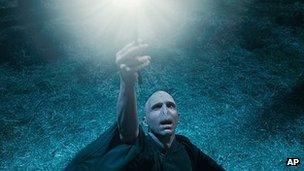Harry Potter films 'boost magical thinking' in children
- Published

Dr Subbotsky said only the scenes of magic in the Harry Potter films helped promote magical thinking
Watching Harry Potter films could make children "more creative" in their problem-solving, researchers in Lancashire have found.
A study by Lancaster University tested whether seeing extracts had an effect on children's use of "magical thinking" to find alternative solutions.
Magical thinking is a psychological term describing non-scientific beliefs.
Dr Eugene Subbotsky said those who watched the films were "significantly better" at problem-solving.
Fifty-two children were involved in the study in two research groups which tested their creativity in action and movement and in drawing impossible objects.
One set of children in each group was shown two 15-minute excerpts from Harry Potter and the Philosopher's Stone before being tested.
Dr Subbotsky said those who watched the magical effects "did significantly better than the others".
"On a small portion, they did twice as well as those who had not watched the films," he said.
Magical thinking involves believing in supernatural events like animals speaking human languages or a witch flying on a broomstick.
This involves the ability to construct an alternative world and research has shown that most young children think magically in everyday life.
'Widely spread phenomenon'
Dr Subbotsky said the idea for the study had come from other research, which had found "a lot of people who consider themselves completely rational and not believers in magic like entertainment with magic nevertheless".
He said that as a result of those findings, he had to change his definition of magical thinking.
"Before, most researchers conflated magical thinking with magical beliefs; for them, if you believe in magic, you are a magical thinker and if you don't, you are not," he said.
"I found that believing in magic and doing magical thinking are two separate things.
"Magical thinking is a very widely spread phenomenon within our rational world."
He said this had made him consider what effect magical thinking might have on children's intellectual thinking.
"If it is so widely spread and every person devotes part of their day to magical thinking, then it might have some important consequences, and those start with children," he said.
He added that he would now seek to extend the study to see how stable the effect is and whether it can be found in adults as well.